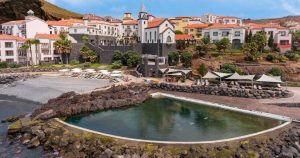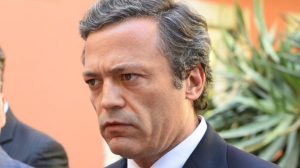At the regional parliament, representatives of two Madeira Taxi Driver Associations met with the islands President, Miguel Albuquerque, the Regional Secretary for Economy, Rui Barreto, and the Regional Secretary for Social Inclusion and Citizenship, Augusta Aguiar, to argue against new digital platforms for passenger transportation, in unmarked vehicles (Individual and Remunerated Passenger Transport TVDE), whose model is being adapted to the region, on the basis that they constitute ‘negative and unfair competition’ in the sector.
Paulo Pereira, of the TáxiRam Association, stated that with a population of 250 thousand inhabitants, there must be fairness and he defended the rule that for each TVDE vehicle there should be 30 taxis. He went on to stress that if this quota is not imposed, 600 taxi companies may soon close, leaving some 850 people unemployed at a time of economic meltdown.
Moreover, Joaquim Marujo, of the Santacruzense de Táxis Association, considered that TVDE, particularly Uber, are “deregulating the market,” by providing the same type of service, but with less legal obligations. He went on to say that “Uber is a predator. It reduces the price in such a way until it destroys the taxi sector and then increases prices as it suits. In the medium and long term, consumers will be harmed”.
Joaquim Marujo defended the ban on the TVDE operation in the Autonomous Region of Madeira, but stressed that the fixing of a fixed number of vehicles would be the “lesser evil”.
Since passenger transport using unmarked vehicles as part of electronic platforms began operating in the archipelago in late 2019, 16 licenses have been issued, mobilizing around 200 drivers and an unknown number of cars.
Paulo PereiraIf warned that if a restriction in the number of vehicles is not made in Madeira, in a year there will be double or triple the number of licenses and drivers. Also, licences should be spread throughout the region to avoid large concentrations of TVDE drivers in the principle areas such as the capital, port and airport.
The two associations further stated that TVDE vehicles must affix a visible certificate identifiable from the outside which includes the licence number and vehicle registration to prevent the car from being used for other purposes.
Joaquim Araújo and Paulo Pereira criticised the statements issued by the General Director of Uber Portugal, Manuel Pina, who said that between 2014, when he started the operation in Portugal, and the end of 2018, the overall turnover of the taxi sector increased by 38%, the number of people employed by 20% and revenue increased by 30%. Critics state these figures are due to the exponential growth of tourism in Portugal during this period.
‘Uber law,’ named as such as they were the first digital platform using unmarked vehicles in Portugal, came into force on the 1st of November 2018, and a transitional period ended on the 1st of March 2019.
In Madeira, the PSD / CDS-PP coalition government put forward a draft legislative decree that adapted the law for Madeira which was generally approved on the 6th of May, although the PCP voted against it, and the JPP and PS abstained from voting.
Samantha Gannon
info at madeira-weekly.com







